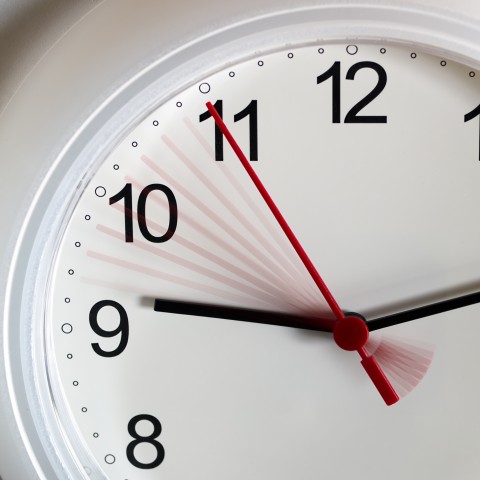
This article is the result of a diligent inquiry into the question of how native Russians are actually telling time in Russian. If you’ve taken a peek at this topic before, you probably know that Russians usually add one of the following words to the number of hours:
- утра (utra) — “of the morning”
- дня (dnya) — “of the day”
- вечера (vechera) — “of the evening”
- ночи (nochi) — “of the night”
But how would you define three a.m.? Is it still night or is it already morning?
Well, the Russian language is very flexible, so both options are possible depending on the context and what you want to emphasize. If you’re talking about early wakeups, saying Сегодня я встал в 3 утра (Segodnya ya vstal v tri utra), or “Today I woke up at three in the morning,” will be just right.
If you want to put an extra dose of indignation because something has woken you up in the middle of the night, then it will be perfect to say: В три ночи меня разбудил звонок от начальника (V tri nochi menya razbudil zvonok ot nachal’nika), meaning “At three of the night I’ve been woken up by a call from my boss.”
Exciting, isn’t it?
Understanding the limits of language flexibility will help you feel more comfortable using the Russian language for telling time in Russian. In this article, we’ll also explore Russian hours and minutes, and learn how to ask the time in Russian. So, let’s take a bite from this delicious, juicy piece of knowledge!
→ If you want to learn about both date and time in Russian, RussianPod101 has prepared an article on Russian Dates for you. The two go hand-in-hand, after all!
 Table of Contents
Table of Contents
1. How to Ask the Time in Russian

So, how do you say “What time is it?” in Russian? There are two main phrases:
- Сколько времени? (Skol’ko vremeni?) — “What time is it?”
- Который час? (Kotoryy chas?) — (lit.) “Which hour is it?” / “What time is it?”
These phrases are used equally for asking about time in Russian, depending on the speaker’s preference. Let’s have a closer look at each phrase so that you can decide which one to use in your active vocabulary.
1- Сколько времени? (Skol’ko vryemeni?)
“What time is it?” in the Russian language is Сколько времени? (Skol’ko vremeni?).
Let’s have a closer look at the words in this question and see how we can expand on it to sound better.
- The word cколько (skol’ko) is a basic question word which means “how much” or “how many.” For example, you can ask Сколько это стоит? (Skol’ko eto stoit?), meaning “How much does it cost?”
- The word время (vremya) means “time.” If you search online for время в России в Москве (vremya v Rossii v Moskve), or “time in Russia Moscow,” the search will show you what time it is in the Russian capital. (By the way, did you know that there are eleven time zones in Russia?)
You can also add “now” to this phrase. It’s not absolutely necessary, but it makes a phrase a bit longer and, thus, more polite. “Now” in Russian is cейчас (seychas). To remember this word, you can divide it into two parts. The first half cей (sey) is a word often found in old Russian literature that means “this.” The second half час (chas) means “hour.” So basically, the word cейчас (seychas) means “this hour.” Cool, right?
Now let’s put it in a phrase: Сколько сейчас времени? (Skol’ko seychas vremeni?) — “What time is it now?”
The phrase became slightly more polite, but it’s still very informal.
If you want to ask your colleague about the time in Russian, you need to add a special phrase in front of this question:
- Ты не подскажешь, сколько сейчас времени? (Ty ne podskazhesh’, skol’ko seychas vremeni?) — “Could you tell me, what time is it now?”
Or this question:
- Вы не подскажете, сколько сейчас времени? (Vy ne podskazhete, skol’ko seychas vremeni?) — “Could you tell me, what time is it now?”
The word подсказать (podskazat’) means “prompt (to).” Use the first question if you’ve agreed to talk with your colleague in an informal way, or as Russians say на “ты” (na “ty”), meaning “using informal ‘you’.” Use the second sentence in all other cases; it’s very polite. If you want to know more about the differences between the Russian formal and informal “you,” read our article on Russian pronouns.
You can make this phrase even more polite, especially if you’re addressing a stranger on the street. Before the question, add Извините, пожалуйста (Izvinite, pozhaluysta), which means “Excuse me, please.” So, the whole phrase will be:
- Извините, пожалуйста, вы не подскажете, сколько сейчас времени? (Izvinite, pozhaluysta, vy ne podskazhete, skol’ko seychas vremeni?) — “Could you tell me, please, what time is it now?”
This phrase will still sound very polite if you exclude the word пожалуйста (pozhaluysta), meaning “please”:
- Извините, вы не подскажете, сколько сейчас времени? (Izvinite, vy ne podskazhete, skol’ko seychas vremeni?) — “Could you tell me, what time is it now?”
It’s totally up to you to use it or not.
Such a transformation! Now you know the first phrase for how to ask the time in Russian both formally and informally.
2- Который час? (Kotoryy chas?)
Now, it’s time to break down the second phrase.
- The word который (kotoryy) means “which” or “what.” For example, you can ask Который из двух тебе нравится? (Kotoryy iz dvukh tebe nravitsya?), meaning “Which one out of the two do you like?”
- In Russian, “hour” is час (chas). We’ve already seen it as part of the word cейчас (seychas), meaning “now.”
You can also add cейчас (yeychas), or “now,” in the middle of the phrase:
- Который сейчас час? (Kotoryy seychas chas?) — “Which hour is it now?”
Also, you can add the polite expressions to the beginning—it works absolutely the same as with the first phrase:
- Извините, вы не подскажете, который час? (Izvinite, vy ne podskazhete, kotoryy chas?) — “Could you tell me, what time is it?”
There you go! So, which phrase do you choose? How do YOU say “What time is it?” in Russian? Share in the comment section below! We’re really curious.
2. Russian Hours

When it comes to talking about time in Russian, it’s important to know which time system to use—twelve-hour or twenty-four-hour. In Russia, people use both systems in different situations. In a conversation, Russians prefer using the twelve-hour clock; in all kinds of official messages (e.g. TV programs, flight schedules, official meetings, etc.), they use the twenty-four-hour clock.
Below, you’ll learn how to use both systems properly for telling time in Russian.
1- Twelve-hour Clock in Russian
At the beginning of this article, you already discovered that the time of day in Russian is added to the number of hours:
утра (utra) — “of the morning”
дня (dnya) — “of the day”
вечера (vechera) — “of the evening”
ночи (nochi) — “of the night”
And Russians choose the word depending on what time of day it is for them. If three a.m. is already morning for you, then use утра (utra), or “of the morning.” If it’s still night, then use ночи (nochi), meaning “of the night.”
Here’s a list that will be helpful for telling time in Russian:
- Час ночи (chas nochi) — “1 a.m.”
- Два часа ночи (dva chasa nochi) — “2 a.m.”
- Три часа ночи (tri chasa nochi) — “3 a.m.”
- Четыре часа ночи (chetyre chasa nochi) — “4 a.m.”
- Пять часов утра (pyat’ chasov utra) — “5 a.m.”
- Шесть часов утра (shest’ chasov utra) — “6 a.m.”
- Семь часов утра (sem’ chasov utra) — “7 a.m.”
- Восемь часов утра (vosem’ chasov utra) — “8 a.m.”
- Девять часов утра (devyat’ chasov utra) — “9 a.m.”
- Десять часов утра (desyat’ chasov utra) — “10 a.m.”
- Одиннадцать часов утра (odinnadtsat’ chasov utra) — “11 a.m.”
- Двенадцать часов дня (dvenadtsat’ chasov utra) — “12 p.m.” or Полдень (polden’) — “Midday”
- Час дня (chas dnya) — “1 p.m.”
- Два часа дня (dva chasa dnya) — “2 p.m.”
- Три часа дня (tri chasa dnya) — “3 p.m.”
- Четыре часа дня (chetyre chasa dnya) — “4 p.m.”
- Пять часов вечера (pyat’ chasov vechera) — “5 p.m.”
- Шесть часов вечера (shest’ chasov vechera) — “6 p.m.”
- Семь часов вечера (sem’ chasov vechera) — “7 p.m.”
- Восемь часов вечера (vosem’ chasov vechera) — “8 p.m.”
- Девять часов вечера (devyat’ chasov vechera) — “9 p.m.”
- Десять часов вечера (desyat’ chasov vechera) — “10 p.m.”
- Одиннадцать часов вечера (odinnadtsat’ chasov vechera) — “11 p.m.”
- Двенадцать часов ночи (dvenadtsat’ chasov nochi) — “12 a.m.” or Полночь (polnoch’) — “Midnight”
You’re probably wondering why the word час (chas) behaves differently after numbers. The thing is that Russian nouns change their endings depending on the numbers that stand before them, according to Russian noun declension rules.
After the number of hours, the noun should be in the genitive case. The only thing that changes is the grammatical number of the noun. For numbers from two to four, the noun should be in the singular form; for numbers five or above, the noun should be in the plural form.
What about numbers like twenty-three? The last number is taken into consideration. Here, the last number is три (tri), or “three,” so the noun after it will behave according to the rules of “three.” By the way, the same rule applies to the word минута (minuta), or “minute,” which we’ll discuss in detail shortly. :)
Please note that Russians don’t usually add один (odin), or “one,” to the beginning of час ночи (chas nochi) meaning “1 a.m.” or час дня (chas dnya) meaning “1 p.m.”
Another thing that you should know is that, in informal speech, Russians usually exclude the word час (chas), or “hour.” So, for example, Одиннадцать часов утра (odinnadtsat’ chasov utra), or “11 a.m.,” will be одиннадцать утра (odinnadtsat’ utra), meaning “11 a.m.”
Now, practice telling time in Russian using the twelve-hour clock. Here are some examples:
- Я встаю в семь утра (Ya vstayu v sem’ utra) — “I wake up at 7 a.m.”
- Сейчас восемь вечера (Seychas vosem’ vechera) — “It’s 8 p.m. now.”
So, what time do you usually wake up? What time is it now? Share in the comments below. In Russian, of course. ;)
2- Twenty-four-hour Clock in Russian

Russians use the twenty-four-hour time system for official purposes. Learn how to tell time in Russian with twenty-four-hour time-tables:
- Один час (chas nochi) — “01:00”
- Два часа (dva chasa) — “02:00”
- Три часа (tri chasa) — “03:00”
- Четыре часа (chetyre chasa) — “04:00”
- Пять часов (pyat’ chasov) — “05:00”
- Шесть часов (shest’ chasov) — “06:00”
- Семь часов (sem’ chasov) — “07:00”
- Восемь часов (vosem’ chasov) — “08:00”
- Девять часов (devyat’ chasov) — “09:00”
- Десять часов (desyat’ chasov) — “10:00”
- Одиннадцать часов (odinnadtsat’ chasov) — “11:00”
- Двенадцать часов (dvenadtsat’ chasov) — “12:00”
- Тринадцать часов (trinadtsat’ chasov) — “13:00”
- Четырнадцать часов (chetyrnadtsat’ chasov) — “14:00”
- Пятнадцать часов (pyatnadtsat’ chasov) — “15:00”
- Шестнадцать часов (shestnadtsat’ chasov) — “16:00”
- Семнадцать часов (semnadtsat’ chasov) — “17:00”
- Восемнадцать часов (vosemnadtsat’ chasov) — “18:00”
- Девятнадцать часов (devyatnadtsat’’ chasov) — “19:00”
- Двадцать часов (dvadtsat’ chasov) — “20:00”
- Двадцать один час (dvadtsat’ odin chas) — “21:00”
- Двадцать два часа (dvadtsat’ dva chasa) — “22:00”
- Двадцать три часа (dvadtsat’ tri chasa) — “23:00”
- Ноль часов (nol’ chasov) — “00:00”
You can listen to our audio lesson to practice talking about time.
Here are some examples for you:
- Совещание назначено на одиннадцать часов (Soveshchaniye naznacheno na odinnadtsat’ chasov) — “The meeting has been appointed to start at 11:00.”
- Московское время двенадцать часов (Moskovskoe vremya dvenadtsat’ chasov) — “The Moscow time is 12:00.”
Practice telling time in Russian by making your own sentences and writing them in the comments section at the end of this article.
3. Minutes in Russian

“Minute” in Russian is минута (minuta). It’s pretty easy to tell the exact time with the twenty-four-hour clock using this word. Just remember the noun declension rule that we discussed for the word час (chas). Let’s see three possible forms of this word:
- Шестнадцать часов сорок одна минута (shestnadtsat’ chasov sorok odna minuta) — “16:41”
- Двадцать один час двадцать три минуты (dvadtsat’ odin chas dvadtsat’ tri minuty) — “21:23”
- Пятнадцать часов тридцать минут (pyatnadtsat’ chasov tridtsat’ minut) — “15:30”
- Пять часов шесть минут (pyat’ chasov shest’ minut) — “05:06”
- Восемь часов ноль минут (vosem’ chasov nol’ minut) — “08:00”
When Russians add minutes, they often omit the words минута (minuta) and час (chas). If there are zeros in the number of minutes, they are pronounced. So, the times above will be pronounced as:
- Шестнадцать сорок одна (shestnadtsat’ sorok odna) — “16:41”
- Двадцать один двадцать три (dvadtsat’ odin dvadtsat’ tri) — “21:23”
- Пятнадцать тридцать (pyatnadtsat’ tridtsat’) — “15:30”
- Пять ноль шесть (pyat’ nol’ shest’) — “05:06”
- Восемь ноль ноль (vosem’ nol’ nol’) — “08:00”
Now, let’s explore how to talk about time in Russia during a conversation.
In Russia, there are two scenarios for choosing a language pattern to give the minutes. The first one is used for the first half of the hour—the minutes from one to thirty. Russians look at the hour after the current one, and count how many minutes of this hour have already passed. For example, it’s 15:03. This means that three minutes of the fifteenth hour have already passed.
Please note that you’ll need to use ordinal numbers. Read our article about Russian numbers to learn more.
Here are some examples:
- Пять минут четвертого (pyat’ minut chetvyortogo) — “3:05”
- Одна минута второго (odna minuta vtorogo) — “1:01 “
- Девятнадцать минут десятого (devyatnadtsat’ minut desyatogo) — “09:19”
This pattern might seem a bit complicated. Believe me, this is true even for Russians! That’s why some of them simply state the hours and minutes, omitting the words минута (minuta) and час (chas):
- Три ноль три (tri nol’ tri) — “3:03”
- Час ноль одна (chas nol’ odna) — “1:01 “
- Девять девятнадцать (devyat’ devyatnadtsat’) — “09:19”
The second pattern is used to talk about the second half of the hour. Russians count how many minutes are left before the upcoming hour. For example, it’s 15:40. This means that twenty minutes are left before the sixteenth hour.
Here are some examples:
- Без двадцати четыре (bez dvadtsati chetyre) — “3:40”
- Без трёх минут девять (bez tryokh minut devyat’) — “8:57”
- Без восьми минут пять (bez vos’mi minut pyat’) — “4:52”
Please note that for the most-used increments of minutes, such as twenty, fifteen, ten, and five, the word “minutes” is almost always omitted.
What about утра (utra)—”of the morning,” дня (dnya)—”of the day,” вечера (vechera)—”of the evening,” and ночи (nochi)—”of the night?” Are they used when we add minutes?
Yes, of course. But in most cases, they’re omitted when it’s clear from the context what part of the day it is.
4. Useful Patterns

Okay, so how do Russians tell time? It’s time to learn patterns that don’t need to include the word “minute.” The following patterns can be used only for the twelve-hour clock system:
- Половина (polovina) — here: “half an hour to”
For example, половина третьего (polovina tryet’yego), meaning “02:30” or “half an hour to three.”
- Пол- (pol-) — here: “half an hour to”
For example, полчетвёртого (polchetvyortogo), meaning “03:30” or “half an hour to four.” Please note that you don’t need to put a hyphen after пол- (pol-) except for with one number: одиннадцать (odinnadtsat’), or “11.” For this number, it will be пол-одиннадцатого (pol-odinnadtsatogo), or “10:30.”
- Четверть (chetvert’) — here: “quarter past”
For example, четверть седьмого (chetvert’ sed’mogo), meaning “06:15” or “quarter past six.”
- Без четверти (bez chetverti) — here: “quarter to”
For example, без четверти десять (bez chetverti desyat’), meaning “09:45” or “quarter to ten.”
The following patterns can be used for both the twelve-hour and twenty-four-hour clock systems:
- Ровно (rovno) — “exactly”
For example, ровно шесть утра (rovno shest’ utra), meaning “exactly 06:00.” Or ровно шесть ноль ноль (rovno shest’ nol’ nol’), meaning “exactly 06:00.”
- Почти (pochti) — “almost”
For example, почти пять часов (pochti pyat’ chasov), meaning “almost 05:00.”
Do you need more words and expressions of time in Russian? Here’s our vocabulary list to talk about time. Check it out!
5. Conclusion

Yaaay, you did it! Now, telling time in Russian shouldn’t feel that hard. You also know how to ask the time in Russian.
To practice telling time in Russian, we strongly recommend that you do a listening practice with our special audio lesson about time.
If you want to dig even more into the topic of time, learn the phrase “What time does it open?” from our audio lesson and check out our article on how to read dates in Russian.
Searching for a professional Russian tutor? Here’s RussianPod101’s MyTeacher program for Russian-learners. Native Russian teachers with impressive teaching backgrounds will help you to understand all the grammar rules and enrich your vocabulary. Just take a trial lesson to see how it works for you. ;-)
Before you go, let us know in the comments what new Russian nouns you learned today! Are there any you still want to know? We look forward to hearing from you!










